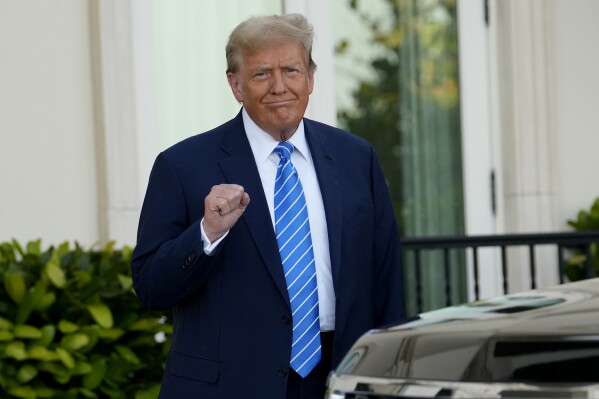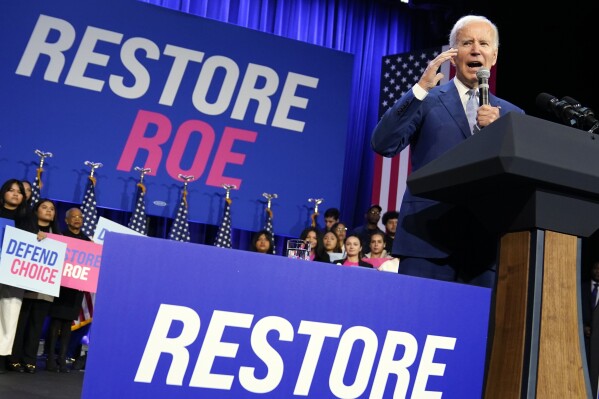Trump’s abortion statement angers conservatives and gives the Biden campaign a new target
NEW YORK (AP) — Donald Trump still says he’s proud that the Supreme Court justices he nominated overturned Roe v. Wade. Yet he again on Monday avoided tough questions about abortion, including whether he would support a national abortion ban should he return to the White House.
The presumptive Republican presidential nominee tried to put to rest an issue widely seen as a general election liability. Instead, his video statement exposed the tough road ahead and inflamed leaders on both sides of the issue.
Religious conservatives said they were deeply disappointed. Progressives said he was lying. And there’s every indication that abortion will define the 2024 election no matter what Trump does or says — in large part because Republicans in Congress and in statehouses across the country continue to fight for new restrictions.
Here are some takeaways exploring the complicated politics of Trump’s latest statement.
Searching for political safe ground
For Trump, fights over abortion, like any other major issue, have always been about winning. And so it should not be a surprise that on Monday he avoided endorsing a ban.
Trump has long tried to steer clear from supporting national restrictions that could be a political disaster for Republicans struggling to win back key groups — especially suburban women — who turned their backs on the GOP in recent years.



Trump remains eager to take credit for the reversal of Roe v. Wade. He did so again in Monday’s video posted to his social media site. But even at the state level, abortion bans enacted after Roe was overturned have been deeply unpopular.
So, Trump simply tried to punt abortion back to the states.
“The states will determine by vote or legislation or perhaps both. And whatever they decide must be the law of the land,” Trump said of abortion rights. “Now, it’s up to the states to do the right thing.”
Religious conservatives, of course, have been fighting against abortion rights for decades on the grounds that abortion should be stopped at all costs — even if they pay a price at the ballot box.
But Trump wants to win in 2024. And in his statement, he made clear that he’s trying to make the best of a bad political situation for him and his party.
“We must win,” he said. “We have to win.”
Biden’s reelection mobilizes
Democrats would have had more ammunition this November if Trump had publicly embraced a national abortion plan on Monday. But Biden’s party still has plenty to work with.
Even in Monday’s statement, Trump said he was “proudly responsible” for the Roe reversal.
Within hours, the Biden campaign announced plans to release a new advertisement seizing on Trump’s position. Prominent pro-choice groups lashed out as well, with many arguing that Trump cannot be trusted after his leading role in overturning abortion rights.
Biden issued a seven-paragraph statement labeling Trump singularly “responsible for creating the cruelty and the chaos that has enveloped America” since Roe was overturned.
“Trump is scrambling,” the Democrat said. “He’s worried that since he’s the one responsible for overturning Roe the voters will hold him accountable in 2024. Well, I have news for Donald. They will.”
National Democrats intend to blame Trump not just for abortion bans in conservative-led states but for the restriction of fertility treatments in Alabama after the state Supreme Court ruled that embryos should be considered children and awarded legal protections.
Biden’s campaign announced Sunday that it would hold campaign events featuring two women, one from Texas and the other from Louisiana, who say they were denied medical care due to restrictive abortion laws enacted after Roe was overturned.
Meanwhile, Republicans simply don’t have an effective counterargument.
In his video, Trump repeated the GOP’s longstanding argument that it is Democrats, not Republicans, who are extreme on abortion because they support abortion rights with no restrictions. Such arguments, while debatable, have not been effective over the last two years. Conservatives have suffered stinging defeats in elections dominated by the abortion-rights debate from Kentucky to Ohio to Michigan.
A test for Trump’s base
The reaction from the Republican Party’s religious conservatives wasn’t positive either.
“We are deeply disappointed in President Trump’s position,” said Marjorie Dannenfelser, the president of the anti-abortion Susan B. Anthony Pro-Life America.
Former Vice President Mike Pence, who has declined to endorse his former running mate this year, put it this way: “President Trump’s retreat on the Right to Life is a slap in the face to the millions of pro-life Americans.”
On social media, some conservatives latched onto Trump’s reference to the term “abortion rights,” arguing that such rights do not exist. Even Sen. Lindsay Graham, R-S.C., a vocal Trump ally, said on X that he “respectfully” disagrees with Trump’s new position.
Trump is making the calculation that his evangelical base, among the most loyal elements in his coalition, will have his back when it matters most. And recent history suggests he’s probably right.
Dannenfelser and others have been pushing Trump to embrace a national abortion ban for several months. Trump, of course, has not. And still, Trump cruised to an easy victory in the GOP primary.
He even won the Iowa caucuses, historically ruled by religious conservatives, by 30 points.
If his waffling on abortion didn’t hurt him with the GOP base in the primary, it’s hard to see them turning against him this fall.
Big questions remain
Trump on Monday talked in more substance than we’re used to. But he hardly put the issue to rest.
In the coming days, Trump will almost certainly be pressed to respond to religious conservatives who condemned his position. Perhaps more importantly, he’ll also be asked to clarify key questions that he avoided altogether.
Trump did not explicitly state whether, if elected again, he would or would not sign a national abortion ban should it reach his desk.
While it’s unlikely such a proposal could meet a 60-vote Senate threshold, a majority of House Republicans have endorsed a national abortion ban as part of a budget proposal unveiled this spring by the Republican Study Committee.
At the same time, Trump did not outline his position on a Florida ballot measure that would preserve abortion rights in the state constitution if approved in November. Trump, of course, is a Florida resident who will have an opportunity to cast a vote for or against the proposal.
A new Florida law signed by Republican Gov. Ron DeSantis will soon take effect banning abortions at six weeks of pregnancy, which is before many women realize they’re pregnant. Trump promised last week that he would issue the statement he gave Monday after being asked about the state law.
Also left unanswered: Whether Trump supports access to the FDA-approved abortion medication mifepristone, which is widely available through the mail.
Still a defining issue
Whether Trump’s GOP likes it or not, abortion will be a defining issue for many voters when they decide the presidency this fall.
The Roe reversal is still fresh for many voters who have only just begun to grapple with Republican-backed abortion restrictions in their states. At the same time, voters in several states are expected to decide whether to enshrine abortion rights into state law this November.
For now, it’s not clear exactly how many states will vote on abortion ballot measures. In some, the question is whether amendment supporters can get enough valid signatures. In others, it’s up to the legislature. And there’s legal wrangling in the process in some states.
So far, abortion rights are definitely on the ballot in Florida, Maryland and New York. And efforts are also underway to do the same in Arizona, Arkansas, Colorado, Missouri, Montana, Nebraska, Nevada and South Dakota.
Disclaimer: The copyright of this article belongs to the original author. Reposting this article is solely for the purpose of information dissemination and does not constitute any investment advice. If there is any infringement, please contact us immediately. We will make corrections or deletions as necessary. Thank you.






